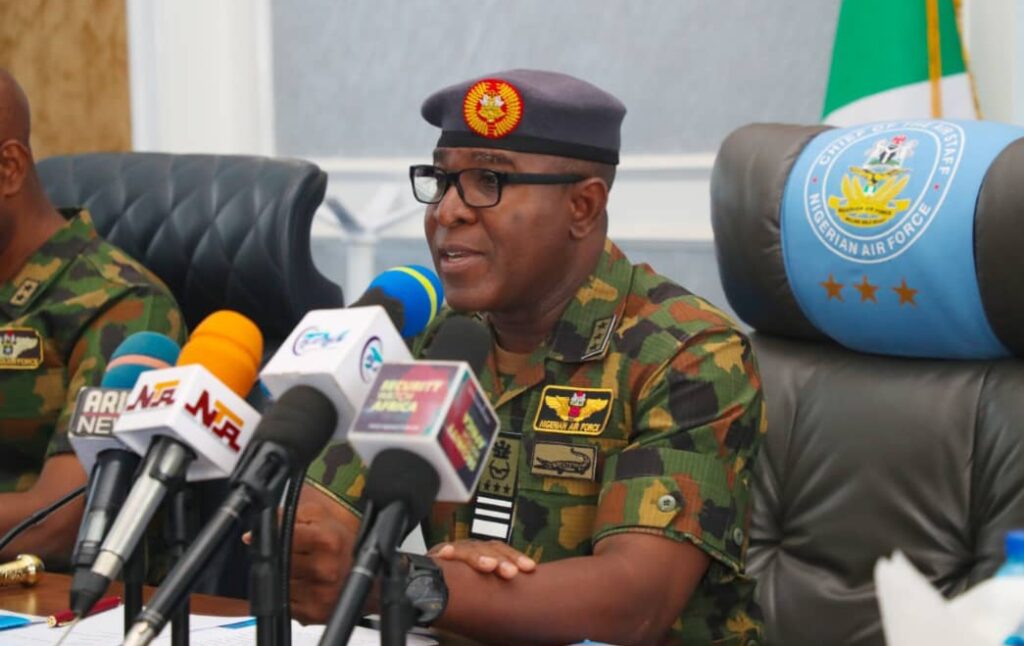After a period of relative calm in Nigeria’s North East, a resurgence in Boko Haram and Islamic State West Africa Province (ISWAP) attacks has reignited fears across Borno and Yobe states. In recent weeks, the militant groups have launched a series of deadly assaults, including daring raids on military bases, killing soldiers, stealing weapons, and, in some instances, deploying drones in their operations.
In an exclusive interview with Vanguard to mark the 61st anniversary of the Nigerian Air Force (NAF), the Chief of Air Staff, Air Marshal Hasan Bala Abubakar, opened up on the challenges confronting Nigeria’s counterinsurgency efforts. The Air Chief highlighted the fluctuating nature of insurgencies and the heavy cost of maintaining air superiority in an increasingly complex battle space.
“Insurgencies are long-term issues,” he said, noting that the brief lull in violence was a result of intensified military pressure in 2023, which led to mass surrenders. However, with the shift of attention to banditry in the North West, insurgents in the North East regrouped. “The impression was that the North East had stabilized, but clearly, the threat remains,” Abubakar explained.
According to him, military efforts alone can only address about 25 to 30 percent of the insecurity. The rest, he said, must come from non-kinetic strategies that address poverty, unemployment, and the lack of meaningful engagement, root causes of radicalization. “Even when the military achieves success, without the whole-of-society approach, those efforts can quickly unravel,” he warned.
He also emphasized the need for stronger civil-military relations, revealing that the NAF has begun collaborating with state governments to implement community outreach initiatives, including free healthcare and educational programs.
On the economic burden of air operations, Abubakar revealed staggering figures. “A single missile fired from our Chinese-made UAV costs $150,000, and the bomb it carries costs around $95,000,” he disclosed. These figures do not include maintenance, fueling, or training, which can raise operational costs to between $10,000 and $30,000 per flight. “Running the Air Force is extremely expensive,” he said.
With terrorists now deploying drones against Nigerian troops, concerns have risen over NAF’s readiness to counter such threats. Abubakar admitted the adversaries are getting more sophisticated, modifying commercial drones for combat. He pointed to a critical need for investment in radar coverage and artificial intelligence. Currently, Nigeria lacks a full military radar network, limiting low- and mid-level airspace monitoring essential for drone detection.
“We need a comprehensive military radar coverage that can detect any unauthorized object in our airspace; low, mid, or high level. Unfortunately, we don’t have that yet,” he said. However, he noted that smaller counter-drone systems have been installed in some military locations.
The Air Chief also revealed that NAF is collaborating with international institutions to build local capacity in emerging technologies. A recent Memorandum of Understanding was signed with the University of Bradford’s Centre for Artificial Intelligence to train Nigerian personnel and expand research into AI-powered defense solutions.
Responding to concerns over delays in deploying air support during ground attacks, such as the recent terrorist ambush in Marte, Borno State, the Air Marshal cited coordination as an ongoing challenge. He emphasized that synergy across services is improving but acknowledged that more work is needed. To this end, the NAF has established an Air-Ground Integration School to train personnel from other services for seamless operational collaboration.
On manpower, Abubakar stated that while recruitment has been approved, the real challenge lies in ensuring adequate training, housing, and long-term administration. “Recruiting is easy; managing the consequences of mass enlistment is the difficult part. We must avoid bringing in individuals who cannot be properly trained or integrated,” he cautioned.
